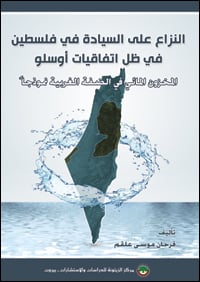Al-Zaytouna Centre for Studies and Consultations in Beirut has published a new book in Arabic entitled The Conflict over Sovereignty in Palestine in the Light of the Oslo Accords: Water Reserves as a Model, which is authored by Farhan Musa Alqam.
The 214-page book is a thesis by which the author has acquired his Master’s Degree in Israeli Studies from Regional Studies Institute at Al-Quds University in 2012.
The study seeks to expand our understanding regarding the conflict over sovereignty in Palestine in light of the Oslo Accords, as well as over water reserves and Israel’s water policy in the West Bank (WB). It makes us more aware of the ways to face this policy through these agreements.
| Publication Information Arabic Title: Al-Niza‘ ‘ala al-Siyadah fi Filastin fi Zill Itifaqiyyat Oslo: al-Makhzuwn al-Ma’i Namudhajan (The Conflict Over Sovereignty in Palestine in the Light of the Oslo Accords: Water Reserves as a Model) Author: Farhan Musa Alqam Edition: 2016 (1st Edition) Paperback: 214 pages. Price: $10 |
 |
The book is divided into five chapters addressing the geographic characteristics of the WB and its water resources, Palestinian water in international laws and treaties, and the Israeli hegemony over these sources after 1967. The book includes important documents and wraps up with conclusions and recommendations focused on the principle of the Palestinian people’s permanent sovereignty over their land where the Israeli occupation has deprived them from this right.
The study has adopted the historical methodology to track Israel’s water policy in the region under study. In addition, the descriptive and analytical methodology was used to describe and analyze the impact of the Oslo Accords on Israel’s water policy based on published books, both in English and Arabic, and by conducting interviews with officials, advisers and experts in the issue of water.
The researcher concludes that Israel has been keen on making these agreements meaningless as was revealed in the deterioration of quantities of water provided to Palestinians in 2008 by around 50 million cubic meters (MCM) compared to what they were entitled to in the Oslo Accords. Figures presented in the book show that Palestinians in 2008 got only 88 MCM of water and while there was 42.8% increase in population, the total received by Palestinians increased only by 5.3%, consequently the annual individual health deteriorated by 26.3%. Also, there has been decline in domestic production by 16.7% and increase in export from Israel by 98.6% over the same period.
The researcher concludes that the priority is for putting an end to the suffering of Palestinians in the issue of water. First through empowering Palestinians to be able to exercise their sovereignty over their land and natural resources, especially water resources, according to international water law and international treaties and covenants concerned with organizing joint administration of water. Second, the researcher suggests the need to find a quick solution for Palestinian water crises though increasing production of groundwater for Palestinians in the WB, and providing the Gaza Strip with needed water supply.
Al-Zaytouna Centre for Studies and Consultations, 7/3/2016




Leave A Comment